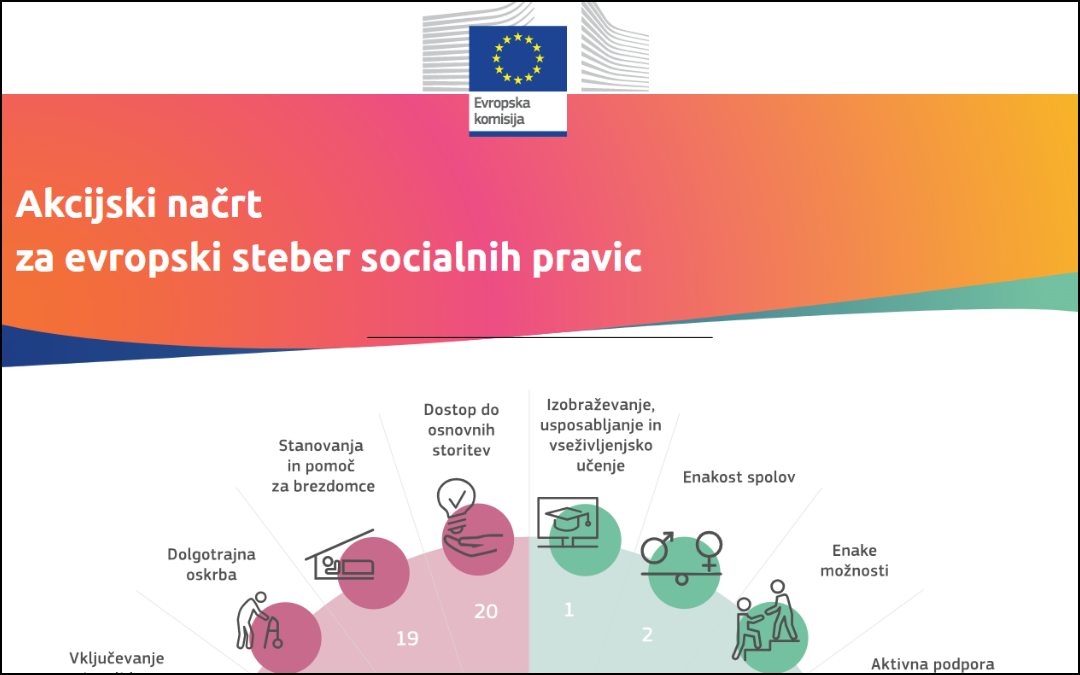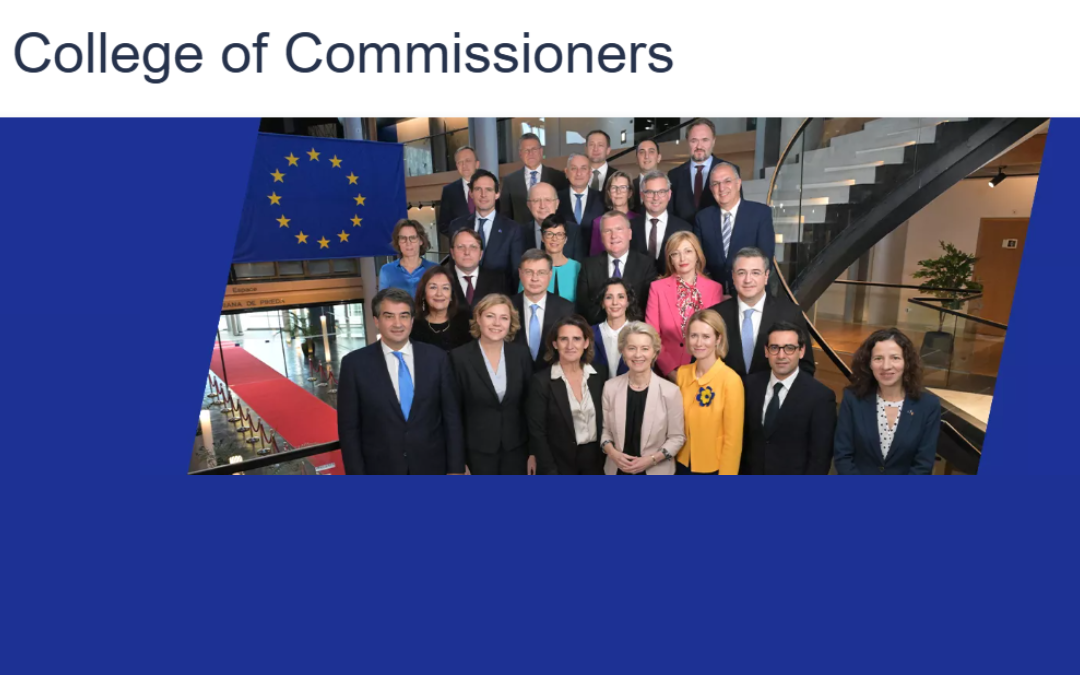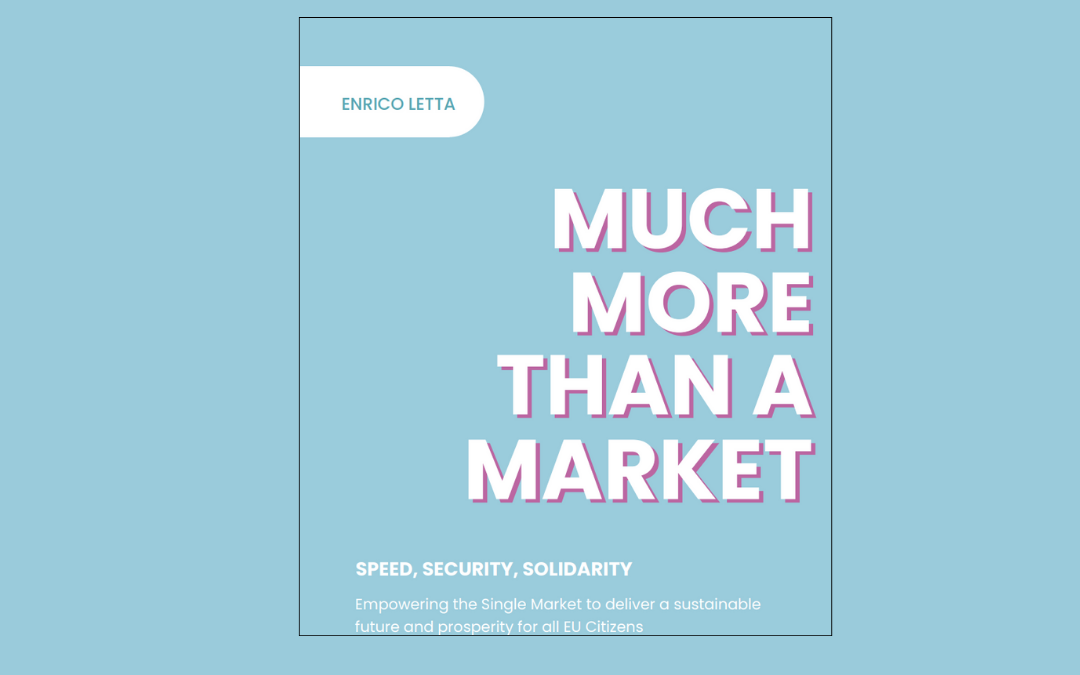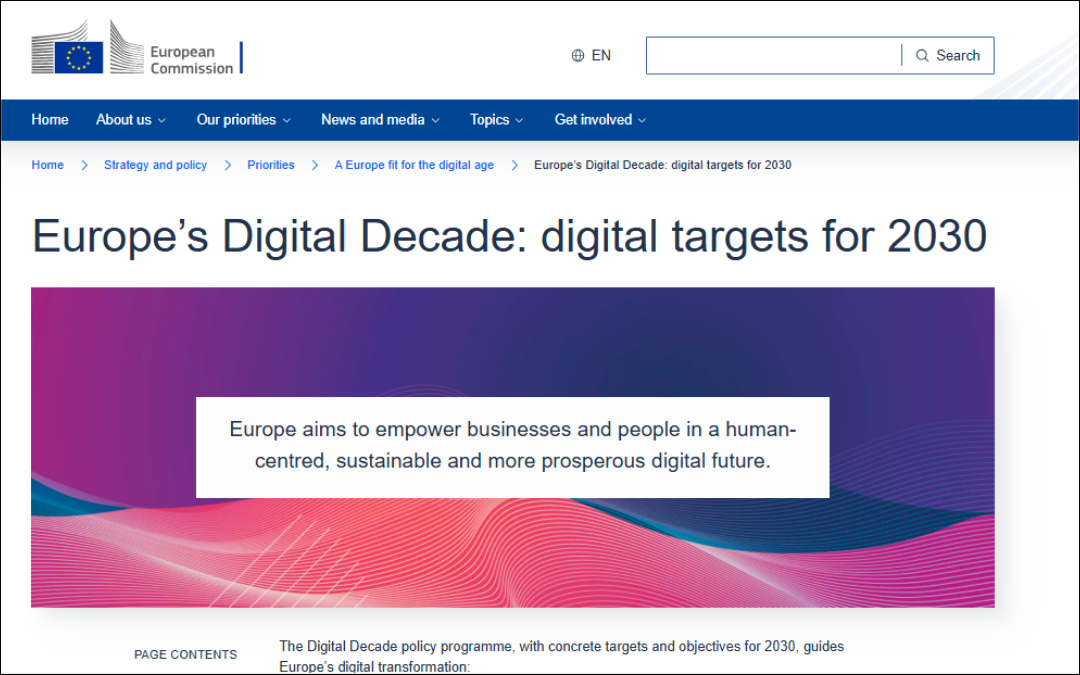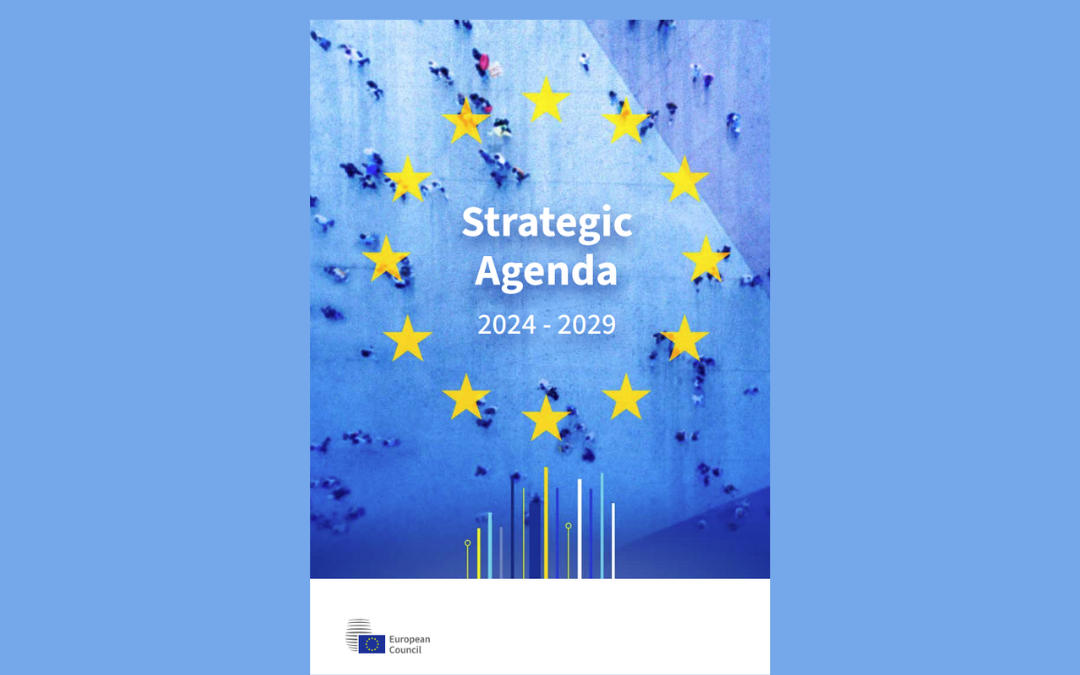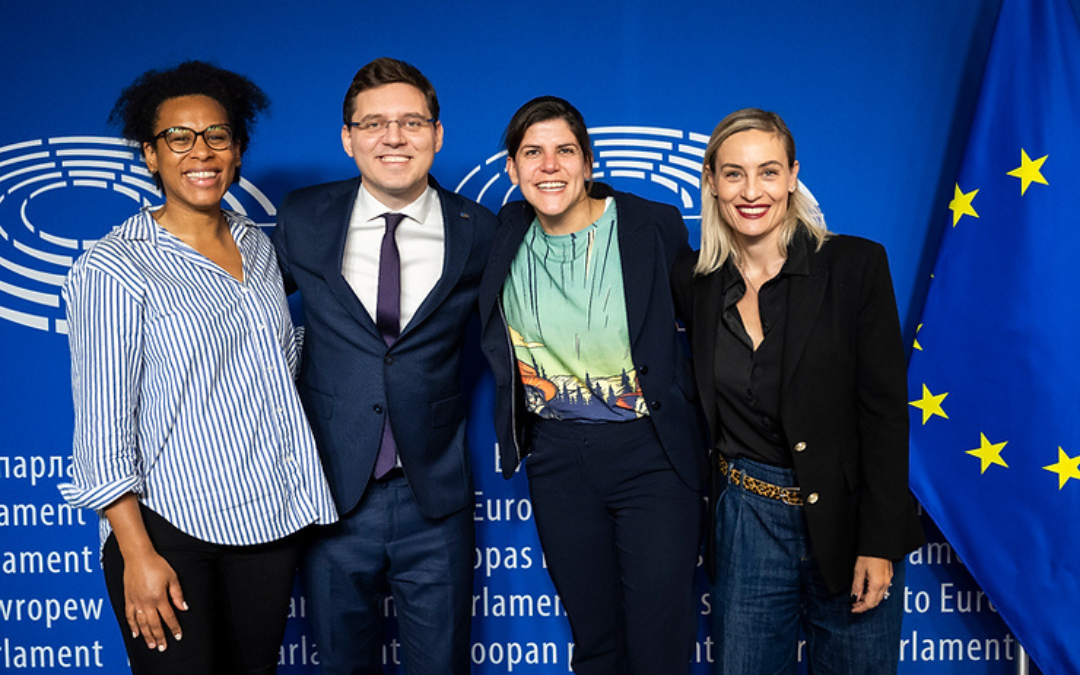At the end of November last year, the EP approved the new EC, once again led by Ursula von der Leyen. It is expected that specific policies will continue (e.g. the implementation of the European Pillar of Social Rights, which prioritises education, training and lifelong learning) alongside the introduction of new ones. The directions for these were already evident following the European elections in June 2024 and earlier.
In June, the European Council, in its Strategic Agenda 2024–2029, laid the foundations for shaping the political programme of the new EC. In light of current challenges, EU leaders identified three priority areas:
- A free and democratic Europe;
- A strong and secure Europe;
- A prosperous and competitive Europe.
Building on this agenda and discussions with EP political groups, President von der Leyen has set seven priorities for the Commission’s new mandate:
- A new plan for Europe’s sustainable prosperity and competitiveness;
- A new era for European defence and security;
- Supporting people, strengthening our societies and our social model;
- Sustaining our quality of life;
- Protecting our democracy, upholding our values;
- A global Europe;
- Delivering together and preparing our Union for the future.
It is worth recalling that in October 2022, von der Leyen launched the European Year of Skills (May 2023–May 2024). She began her new mandate with a pledge to establish a Union of Skills.
In her address, she highlighted adult education and training, as well as lifelong learning, primarily in connection with the labour market and the shortage of specific skills. She emphasised support for small and medium-sized enterprises. She announced increased investments in acquiring and retaining knowledge and skills, recognising various forms of training and the skills achieved through them and further enhancing labour mobility in Europe. She attributed the most significant importance to digital skills.
In line with this vision, von der Leyen prepared letters for the commissioners, executive vice-presidents and high representatives of the College of Commissioners, outlining their missions. Among the members of the College is Romanian Roxana Mînzatu, who is responsible for social rights and skills, quality jobs and preparedness.
The new European guidelines, tasks and measures will undoubtedly impact adult education. How? Gina Ebner and Raffaela Kirher of the EAEA presented the association’s perspectives during an online meeting of EAEA members in early December, highlighting the two reports below.
Enrico Letta’s report
At the request of the EC, former Italian Prime Minister and current President of the Jacques Delors Institute, Enrico Letta, prepared a report on the future of the single market titled Much More than a Market. Speed. Security. Solidarity. Empowering the Single Market to deliver a sustainable future and prosperity for all EU Citizens. Published on 17 April 2024, it played a significant role in shaping the political direction of the new EC mandate.
In the report, Letta affirms that the single market remains the cornerstone of European integration and values. However, he argues that the pressing socio-economic challenges demand a new strategic vision. He emphasises the need for a more unified approach in areas such as finance, energy and electronic communications. To achieve a sustainable future and prosperity for all EU citizens, Letta proposes introducing a fifth freedom in addition to the EU’s existing four freedoms (the free movement of people, goods, services and capital): the free movement of knowledge. This fifth freedom is based on the understanding that data, knowledge and skills are the key resources for Europe’s future competitiveness and progress.
Letta emphasises the importance of research, innovation and education and advocates for the establishment of a centralised digital knowledge platform called the European Knowledge Commons. This proposal aims to harness the “collective intelligence” across Europe. Letta is also a strong proponent of incorporating the social dimension – fairness and cohesion – insisting that the new strategy must benefit all EU citizens. He assigns a critical role to digital skills, arguing that they are essential for enabling everyone a knowledge-based participation in society and the economy.
Building on Letta’s report, von der Leyen identified five key action areas to enhance Europe’s competitiveness: unlocking more capital for European businesses, ensuring energy independence and cheaper energy, unlocking the full potential of trade, addressing the skills shortage and nurturing digital innovation.
While the Much More than a Market report has a strong social focus, it can be concluded that it is not a holistic document – a limitation that also applies to the measures derived from it.
Mario Draghi’s report
Former President of the European Central Bank and former Italian Prime Minister Mario Draghi presented a report on the future of European competitiveness (The Future of European Competitiveness – A Competitiveness Strategy for Europe) to the European Parliament last September. The report and related texts are available here.
The report highlights the urgent need for Europe to address its knowledge and skills deficit, with digital skills identified as particularly critical. This issue is already being addressed through Europe’s Digital Decade initiative, which aims for 80% of the working-age population to acquire at least basic digital skills by 2030.
Draghi also underscores the importance of basic skills for productivity and effective participation in the labour market. He attributes the undersupply of skills to five key factors: the gradual decline of educational systems, a shrinking working-age population, low labour mobility, poor working conditions and the limited reach of adult education.
He calls on the education and training system at all levels to provide citizens with quality knowledge and skills in an inclusive manner.
He argues that AE has become critically important, as knowledge and skills must be continuously and rapidly upgraded in times of rapid technological change. This is essential for individuals, businesses and European society as a whole. However, AE remains undervalued and insufficiently integrated into the education and training system. As a result, adult participation is still (too) low in many countries and across the EU, and efforts are often disconnected from labour market policies.
Draghi is particularly critical of the way skills development is funded, not just its scale. He identifies several issues: inefficient coordination of funding (via the ESF+ programme), the EC’s limited influence on the relevance and quality of funded projects, insufficient involvement of member states in initiatives like the Pact for Skills, and difficulties in reaching key target groups most in need of education and training, such as employees in small and medium-sized enterprises.
He advocates for significantly greater efficiency in the governance, implementation and evaluation of policy initiatives for knowledge and skills development. Achieving this would require moving beyond current approaches, primarily soft and limited coordination, and ensuring more active involvement of social partners and businesses. Draghi calls for a rethinking of skills development policy, treating it as a strategic investment in creating a so-called Union of Skills focused on high-quality skills, regardless of where or how they were acquired.
Draghi’s critical and thought-provoking messages are highly relevant to our field of work. However, they would carry even greater significance if they were not limited primarily to the working-age population.
EP intergroups are forums for nonformal exchanges of views on specific topics among different political groups. Each group is composed of representatives from at least three political groups and is also intended to facilitate contact with member states and civil society.
The Intergroup on the Future of Education will support the EP’s efforts in lifelong learning and the development of individuals’ skills. Its mission, as stated, is to contribute to building a more inclusive, innovative, resilient, competitive and forward-looking Europe, prepared to lead in a rapidly changing world. The intergroup aims to address pressing challenges comprehensively, including teacher and educator shortages, upskilling and reskilling for the digital and green transitions, declining basic skills, skill shortages in specific sectors and other related issues.
We will undoubtedly report further on their work and achievements in our E-newsletter.
Let us briefly summarise the impact of current European policies on ALE in Europe and Slovenia:
- At the political level, the importance of adult education and training is now widely recognised, but the focus remains on acquiring knowledge and skills for the labour market.
- Formal adult education alone is insufficient; a culture of lifelong learning is essential. This requires rethinking the functioning of all levels of the education system (life-long) and adopting a cross-sectoral approach across all policies (life-wide).
- The primary target group of new European policies continues to be the working population, while older adults and vulnerable groups are largely overlooked.
- Anticipating future knowledge and skills needs is crucial for understanding which skills should and will be required and why.
- Employers must be significantly more aware of and engaged in designing and delivering education and training programmes.
- Conversely, the education system must adapt to deliver high-quality knowledge and skills aligned with current needs (particularly those of the labour market) and enhance its flexibility to respond to changing circumstances.
- Digital and green skills, as well as basic skills, are recognised as priorities. However, transversal skills are rarely mentioned in key documents.
- A reduction in funding for ESF+ and Erasmus+ programmes after 2027 has been announced. At the same time, there is a call for improved governance and evaluation of investments at European, national and local levels.
We can either remain passive recipients of these anticipated changes (which will inevitably affect us, for instance, through E+ and ESF+ projects) or take a proactive stance and become the drivers of new developments. The choice is ours, and we must rise to meet these challenges.
Zvonka Pangerc Pahernik, MSc, (zvonka.pangerc@acs.si), SIAE

